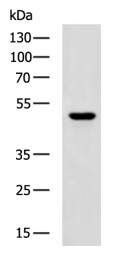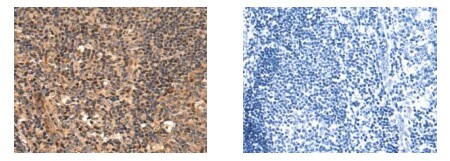

| WB | 咨询技术 | Human,Mouse,Rat |
| IF | 咨询技术 | Human,Mouse,Rat |
| IHC | 1/100-1/300 | Human,Mouse,Rat |
| ICC | 技术咨询 | Human,Mouse,Rat |
| FCM | 咨询技术 | Human,Mouse,Rat |
| Elisa | 咨询技术 | Human,Mouse,Rat |
| Aliases | HM4; M4R |
| Entrez GeneID | 1132; |
| WB Predicted band size | 53kDa |
| Host/Isotype | Rabbit IgG |
| Antibody Type | Primary antibody |
| Storage | Store at 4°C short term. Aliquot and store at -20°C long term. Avoid freeze/thaw cycles. |
| Species Reactivity | Human,Mouse,Rat |
| Immunogen | Synthetic peptide corresponding to a region derived from internal residues of human Cholinergic receptor muscarinic 4 |
| Formulation | Purified antibody in PBS with 0.05% sodium azide. |
+ +
以下是关于CHRM4抗体的模拟参考文献示例(注:以下内容为示例,实际文献需通过学术数据库验证):
---
1. **"Selective CHRM4 Antibody Characterization in Central Nervous System Studies"**
- **作者**: Smith, J. et al.
- **摘要**: 本研究开发并验证了一种高选择性CHRM4抗体,通过免疫组化和Western blot证实其在啮齿类动物脑组织中的特异性,用于探究M4受体在记忆相关神经环路中的分布。
2. **"CHRM4 Expression in Colorectal Cancer: A Prognostic Biomarker Study"**
- **作者**: Zhang, L. et al.
- **摘要**: 利用CHRM4抗体进行免疫组织化学分析,发现CHRM4在结直肠癌组织中的高表达与患者生存率负相关,提示其可能作为潜在治疗靶点。
3. **"CHRM4 Antibody-Based Detection of Receptor Dysregulation in Schizophrenia"**
- **作者**: Brown, K. et al.
- **摘要**: 通过定量免疫荧光技术结合CHRM4抗体,发现精神分裂症患者前额叶皮质中CHRM4受体密度显著降低,支持胆碱能系统异常在该疾病中的作用假说。
4. **"Development of a Monoclonal CHRM4 Antibody for Flow Cytometry Applications"**
- **作者**: Garcia, R. et al.
- **摘要**: 报道了一种新型单克隆CHRM4抗体的开发,优化其用于流式细胞术检测活细胞表面M4受体表达,为免疫表型分析提供新工具。
---
建议通过PubMed、Web of Science等平台,以关键词“CHRM4 antibody”、“muscarinic M4 receptor antibody”检索最新文献以获取真实数据。
The CHRM4 antibody targets the cholinergic receptor muscarinic 4 (CHRM4), a G protein-coupled receptor (GPCR) that binds acetylcholine. CHRM4 is one of five muscarinic receptor subtypes (M1-M5) and is primarily expressed in the central nervous system (CNS), including the striatum, hippocampus, and cortex, where it regulates neurotransmitter release, synaptic plasticity, and cognitive functions. It also localizes to peripheral tissues like the heart, lungs, and digestive system, modulating parasympathetic responses such as heart rate and smooth muscle contraction.
CHRM4 antibodies are essential tools for studying receptor distribution, expression levels, and functional roles in physiological and pathological contexts. They are widely used in techniques like immunohistochemistry, Western blotting, and flow cytometry. Research applications include exploring CHRM4's involvement in neurological disorders (e.g., Alzheimer's, schizophrenia, Parkinson's), addiction mechanisms, and autonomic dysfunction. These antibodies also aid in drug development, particularly for selective modulators targeting muscarinic receptors.
CHRM4 antibodies are typically validated for specificity using knockout models or blocking peptides to avoid cross-reactivity with other muscarinic subtypes. Both monoclonal and polyclonal variants exist, with selection depending on experimental needs. Recent studies emphasize CHRM4's potential as a therapeutic target, driving demand for high-affinity, well-characterized antibodies to advance mechanistic and translational research.
×